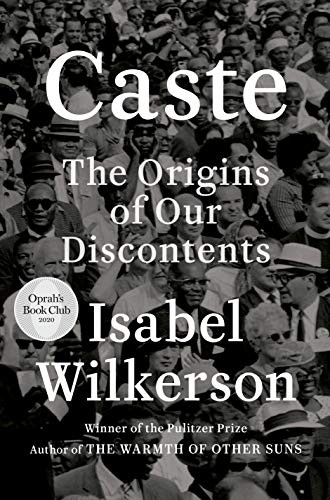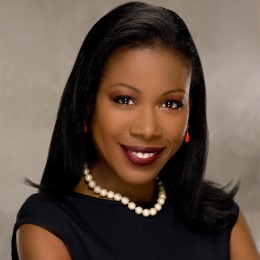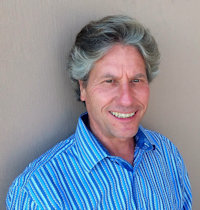Caste: The Origins of Our Discontents

from amazon.com
In this brilliant book, Isabel Wilkerson gives us a masterful portrait of an unseen phenomenon in America as she explores, through an immersive, deeply researched narrative and stories about real people, how America today and throughout its history has been shaped by a hidden caste system, a rigid hierarchy of human rankings.
Beyond race, class, or other factors, there is a powerful caste system that influences people’s lives and behavior and the nation’s fate. Linking the caste systems of America, India, and Nazi Germany, Wilkerson explores eight pillars that underlie caste systems across civilizations, including divine will, bloodlines, stigma, and more. Using riveting stories about people—including Martin Luther King, Jr., baseball’s Satchel Paige, a single father and his toddler son, Wilkerson herself, and many others—she shows the ways that the insidious undertow of caste is experienced every day. She documents how the Nazis studied the racial systems in America to plan their out-cast of the Jews; she discusses why the cruel logic of caste requires that there be a bottom rung for those in the middle to measure themselves against; she writes about the surprising health costs of caste, in depression and life expectancy, and the effects of this hierarchy on our culture and politics. Finally, she points forward to ways America can move beyond the artificial and destructive separations of human divisions, toward hope in our common humanity.
Beautifully written, original, and revealing, Caste: The Origins of Our Discontents is an eye-opening story of people and history, and a reexamination of what lies under the surface of ordinary lives and of American life today.
https://www.amazon.com/Caste-Origins-Discontents-Isabel-Wilkerson-ebook/dp/B084FLWDQG
Author: Isabel Wilkerson

Isabel Wilkerson (born 1961) is an American journalist and the author of The Warmth of Other Suns: The Epic Story of America's Great Migration and Caste: The Origins of Our Discontents. She was the first woman of African-American heritage to win the Pulitzer Prize in journalism.
Wilkerson was the editor-in-chief of the Howard University college newspaper, interned at the Los Angeles Times and Washington Post, and became the Chicago Bureau Chief of The New York Times. She also taught at Emory, Princeton, Northwestern, and Boston University.
Wilkerson interviewed over a thousand people for The Warmth of Other Suns, which documents the stories of African Americans who migrated to northern and western cities during the 20th century. Her book Caste identifies the racial hierarchy in the United States as a caste system. Both books were best-sellers.
Reviewed by: John Stokdijk

Caste: The Origins of Our Discontents by Isabel Wilkerson is a very successful book. As I write this, it has been on The New York Times Best Sellers and Amazon Top Sellers lists for 51 weeks. It was on Oprah's New Book Club Pick. It received several awards and honors. Netflix announced that it would produce a film adaptation of the book.
The Ajijic Book Club selected Caste for its August, 2021 meeting. I had agreed to lead the discussion and was therefore committed to reading this book. Without an obligation to do so, I would not have read much of it.
The point at which I would otherwise have stopped reading was the following sentence in Chapter Three, and I will explain why later in this report.
The anthropologist Ashley Montagu was among the first to argue that race is a human invention, a social construct, not a biological one, and that in seeking to understand the divisions and disparities in the United States, we have typically fallen into the quicksand and mythology of race.
I hoped that the book would prove my early misgivings were misplaced, but it did not.
The central argument of Wilkerson’s book is that the concept of caste is better than the concept of race for an understanding of the problems between white people and black people in the United States. I was skeptical of her argument from the beginning and I was unpersuaded at the end. It seems to me that Wilkerson has good intentions but contributes little to a search for solutions and is probably further stirring up muddy waters.
As a teenager I read, and was greatly influenced by, a book first published in 1961. Black Like Me was written by the white journalist John Howard Griffin who had his skin temporarily darkened to successfully pass as a black man. For several weeks he traveled through the racially segregated Deep South of the USA. His experiences were terrible, to say the least. For exposing the hostility of white people towards black people, it was necessary for Griffin to move to Mexico for several years because of threats and concerns for his personal safety.
I doubt that the word caste ever appeared in Griffin’s book. I doubt that the concept of caste would have enhanced the book one iota. Sadly, in spite of considerable publicity at the time, his book made little difference.
Recently, by strange coincidence (synchronicity?) I spotted a copy of Black Like Me on a table of used books in Ajijic and I now have it in my possession once again.
As a teenager I followed current events, including what were known as race riots, in the 1960s. In my opinion, viewing these events through a lens of caste rather than race adds nothing of value to any discussion. And it seems to me that whatever limited understanding we have today of race relations in the pivotal decade of the 1960s has made little difference.
My teenage hero was Muhammad Ali. The word caste does not appear in the many quotes for which he is remembered. It seems to me that his straightforward statements added more clarity than Wilkerson’s lengthy argument.
“Hating people because of their color is wrong. And it doesn’t matter which color does the hating. It’s just plain wrong.”
Martin Luther King Jr.’s quotes have stood the test of time, all without any attempt to frame the social justice issues as problems due to a caste system.
The Pew Research Center surveys American attitudes about race. Unfortunately, such research reveals that attitudes remain deeply divided and much more progress is needed. There is not the slightest hint that a focus on caste rather than race would make any difference.
I will now speculate on what may be the motivation, perhaps the unconscious motivation, for Isabel Wilkerson writing Caste: The Origins of Our Discontents. The Black / White divide can be viewed as tribal warfare. The Black Lives Matter movement can be viewed as a growing group of social justice warriors. But this is not what I am referring to. There are many more divides in the highly fragmented American society of today.
One of the deep divides that concerns me greatly is the Woke / Anti-Woke divide and the tribal warfare between these groups. It seems to me that Wilkerson wants to clearly signal that she is Woke. I see many little indications of this in Caste, but perhaps I am merely finding what I am looking for.
To state that race is a social construct and not biological is a very Woke thing to say. But skin color is in fact determined by genetics, by scientific biological laws. Me saying so will get me labeled as Anti-Woke by some and could easily drag me into cultural wars, were I someone of some significance. However, anyone who knows me well will easily grasp that I belong to neither the Woke nor the Anti-Woke tribes. My concern is that Wilkerson has written a book that the Anti-Woke tribe will feast on and I will later do some research to see if this is so.
Another clue of Wilkerson’s Wokeness is the following reference:
While this book is pointedly not about racism in itself, any book that touches on the subject owes a debt to the scholarship of Ibram X. Kendi...
Kendi has been made into a hero by the Woke and a villain by the Anti-Woke, an icon that easily signals tribal loyalties. This book report is not about Kendi. But I will caution everyone to be very careful to distinguish between what Kendi actually says and what the Anti-Woke say he says.
Clear to me is that Isabel Wilkerson has been significantly influenced by Critical Race Theory. In my opinion, far more important than reframing a racial problem as a caste problem is understanding CRT and how it is currently being used in the cultural war between the Woke and Anti-Woke tribes. This dynamic makes an already difficult, unsolved racial divide worse.
To be clear, I am not saying that the Woke and Wilkerson emphasis on power and hierarchy is wrong. But it is incomplete, very incomplete, so incomplete that it becomes very misleading. All human matters are complex, extremely complex. Understanding the impact of power and hierarchy is important, but there is much, much more to understand that is also important. To suggest that making a simple change from race to caste could make a significant difference is a conclusion that I remain unconvinced of.
When I do a search for the word caste in my Kindle version of the book, I get “500 matches found”. She beats the same drum over and over again and I found it annoying. However, there were bits and pieces of the book here and there that I thought were effective, particularly her personal experiences.
In Chapter Fourteen Wilkerson describes being detained and questioned by Drug Enforcement Administration agents.
Now, in the car, away from the agents, I was beginning to comprehend the seriousness of that encounter, only now able to admit my terror.
In Chapter Twenty-Three Wilkerson describes another travel experience.
Then he began to reach for his own bag. It was in the compartment above and behind me. He did not speak nor gesture in my direction. Instead, he reached back and up and over me, wordlessly leaned farther and farther, his body at a backward angle against mine, pinning me under his torso and leaving me no escape because of the wall of passengers packed behind me. I was in disbelief, forced to arch my body back, as he rammed himself harder against me, heavy and sweaty, shifting his feet now, shoving his thick arm across my face and against the side of my neck to unloosen the bag from the compartment. He thrust his full weight, his entire frame, into mine, his back muscles crushing my breasts, his buttocks protruding into my pelvis, violating my body in full view of other passengers, and no one was saying or doing a thing.
And in Chapter 31 she describes her experience with a plumber and the skillful manner in which she established a positive connection.
Just then, the doorbell rang, the call cut short. It was the plumber again. He said he had driven back to shut off the gas to the water heater so it wouldn’t be heating an empty tank. He knew his way around now, made his way to the basement, was lighthearted and chatty, momentarily family.
I also enjoyed Wilkerson’s Epilogue where she writes about the experiences of Albert Einstein as a new American.
He grew uncomfortable with the American way of pressuring newcomers to look down on the lowest caste in order to gain acceptance. Here was one of the most brilliant men who ever lived refusing to see himself as superior to people he was being told were beneath him.
“The more I feel an American, the more this situation pains me,” Einstein wrote. “I can escape the feelings of complicity in it only by speaking out.”
And so he did. He co-chaired a committee to end lynching. He joined the NAACP. He spoke out on behalf of civil rights activists, lent his fame to their cause.
But now I will return to what I did not like about this book.
One theme in Caste is the promotion of the idea that the social dynamics of Nazi Germany, India and the United States of America are similar and best understood as caste systems. I was unconvinced. I particularly thought that Wilkerson did not say very much about India and left me feeling curious rather than informed.
I will agree with something implied in Caste by invoking Nazi Germany, something I am usually critical of, but not in this case. Few horrors in history rise to the level of the holocaust and many such associations are inappropriate. But linking the holocaust and slavery is fitting. Slavery was brutal, and the trauma it caused remains deeply embedded in the collective unconscious mind of America. However, the horror of the treatment of the Jews, and others, in Nazi Germany is measured in years while the horror of slavery is measurd in centuries.
Part Three of Caste gives us a useful framework, THE EIGHT PILLARS OF CASTE. But it falls short for the same reason that most frameworks do. It is presented as THE framework, the one and only right approach, rather than merely one approach which may yield some insights into an extremely complex problem.
Because Caste takes a simple approach, one problem with one solution, everything else falls outside of the scope of this book. It ignores the progress that has been made and the encouraging trends that are likely to continue. Wilkerson, in my opinion, dismisses progress by focusing on a caste system that remains entrenched.
In 1967 the U.S. Supreme Court ruled that state laws prohibiting interracial marriage were unconstitutional. Interracial marriage and cohabitation have been steadily rising since then. This does not happen in a caste system.
There has also been an increase in the number of white Americans who understand that systemic racism is a real thing. The tragic murder of George Floyd does seem to be a turning point. Yet too many still resist this view of reality, but the trend is in the right direction.
And most encouraging is the contrast between younger and older Americans in their attitudes towards these issues.
At this point I decided to look for book reviews of Caste, expecting to see a reflection of the troubling polarization in America.
On Amazon, 1,547 people found the top positive review helpful and 1,429 people found the top critical review helpful. Yes, indeed, polarization. But personally I find most reviews on Amazon, both positive and critical, unhelpful.
One critical review from the left worth reading is What Caste Leaves Out.
Adopting caste as a transnational historical category generates some important insights, but pressing it too far risks confusing different political circumstances. When we conceptualize and resist racial subjugation first and foremost because it is a caste system, we risk losing vital, context-born insights that might aid and energize our political endeavors.
Perhaps my negative attitude towards Caste was magnified by having had enough of this subject matter. ABC selected four other books dealing with race, which I list below. Enough already.
Talking to My Country by Stan Grant
White Rage: The Unspoken Truth of Our Racial Divide by Carol Anderson
James Baldwin: The Last Interview: and other Conversations
The Yellow House by Sarah M. Broom
